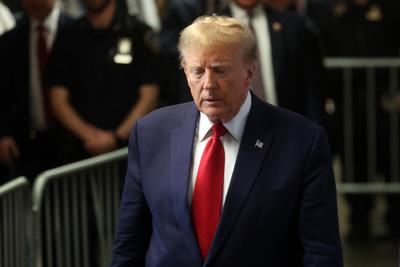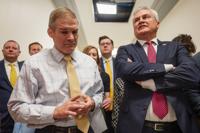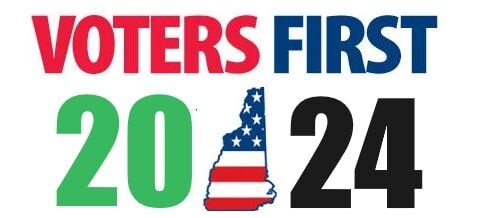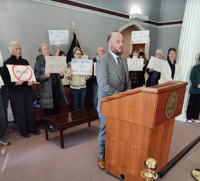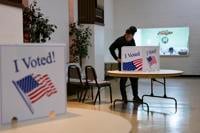TRUMP TRIAL
Porn-star hush money case set • A2
By Erik Larson and Patricia Hurtado
A judge in New York ruled Donald Trump’s trial over alleged hush-money payments to a porn star to influence the 2016 election will start as planned on March 25, making it the first of four criminal cases against the former president to go before a jury.
Trump appeared in a packed Manhattan courtroom Thursday as the schedule was set by Justice Juan Merchan, who had earlier put the trial on hold because of conflicts with plans for the other cases. Lawyers for Trump, the leading Republican candidate for president, had argued for a delay until after the November election.
Starting a trial next month will immediately complicate Trump’s ongoing campaign to return to the White House amid his overlapping legal entanglements. Three other criminal cases are moving toward trials, including two over Trump’s attempt to overturn the result of 2020 presidential election.
In court Thursday, Merchan said the trial should last about six weeks. Trump’s lawyers immediately complained that the judge hadn’t given them the chance to discuss the issue and called the trial date a “great injustice.” Trump’s current scheduling demands are a “completely different landscape” than when the case was first brought, his lawyer Todd Blanche said.
“There are 42 primaries and caucuses during that time period, in the time President Trump has to help prepare for trial,” Blanche said. “This could take us up to the third week of May, where he has been in court four days a week, where his insight and strategy is important. That is an unconstitutional violation.”
Multiple trials
Before Thursday, the hush-money trial had been on hold because the judge in Washington overseeing the federal prosecution of Trump’s attempt to overturn the 2020 election had set a March 4 trial date. But that’s now also on hold while Trump appeals to have the case tossed out.
Blanche told the judge that even though the March 4 election-fraud trial was put on hold, Trump’s team had been busy preparing for it under the impression that that case would go to trial first.
We had to “focus 100% of our attention on preparing for that trial,” he said.
The judge responded by saying that the lawyers brought this on themselves by representing Trump in multiple cases.
“So, you’re not going to be in two places at the same time,” Merchan said. “You willingly chose those two cases. I told you March 25 was a date certain. You preceded at your own peril.”
Trump’s lawyer also argued that a March 25 trial comes too soon after E. Jean Carroll’s defamation trial against the former president, which he says triggered intense media coverage in the city that could taint a jury in the new trial.
“We’ll have to find a jury to put that aside,” Blanche said, complaining about “media saturation” from the fallout from the Carroll verdict. Last month, a New York jury concluded Trump must pay Carroll $83.3 million for defaming her when he denied he sexually assaulted her.
Hush-money payments
Merchan’s decision puts a fresh spotlight on Manhattan District Attorney Alvin Bragg, an elected Democrat whose indictment of Trump in April made him the first prosecutor to charge a former president with a crime. Trump pleaded not guilty and says Bragg’s case — along with three other prosecutions brought against him since then — are part of a Democratic “witch hunt.”
Bragg alleges that during the 2016 presidential campaign, Trump directed his then-lawyer and fixer Michael Cohen to make hush-money payments totaling $130,000 to adult film actor Stormy Daniels to bury her damaging claims of a sexual encounter. Trump is charged with 34 counts of falsifying business records to conceal the true nature of the payments.
Prosecutors allege Trump approved the sum, which Cohen paid days before the election by taking out a home equity line of credit and setting up a shell company. Trump also approved a scheme to disguise reimbursements to Cohen as legitimate legal expenses and signed many checks himself, Bragg says.
Perjury
Cohen’s testimony in the New York Attorney General’s case became a point of contention during that trial after Trump accused him of lying under oath. At issue was Cohen’s testimony that Trump had directed him to inflate his assets. Later in the trial, Cohen changed his story by saying the directive was implied by Trump rather than made directly.
On Thursday’s hearing, Blanche complained that Cohen had committed perjury when he testified in October as another reason to reschedule the trial. But prosecutor Matthew Colangelo said the remedy for that was for Trump’s lawyers to vigorously cross-examine Cohen rather than delay the trial as Blanche requested.
“How can we possibly go to a trial with a witness who committed perjury across the street two months ago?” Blanche said. “They should be investigating him.”
The indictment also covers a $150,000 payment by American Media Inc., which published the National Enquirer, to former Playboy model Karen McDougal to stay silent about another alleged affair with Trump. AMI, which isn’t accused of wrongdoing in the case, later admitted that it paid for McDougal’s story with no intention of publishing it in a bid to help Trump, a practice known as “catch and kill.”
The 34 counts are ordinarily misdemeanors under New York law. But Bragg charged them as Class E felonies because he claims they were committed to violate state and federal election law. While Class E felonies are the least serious, they carry maximum penalties as long as four years in prison.

